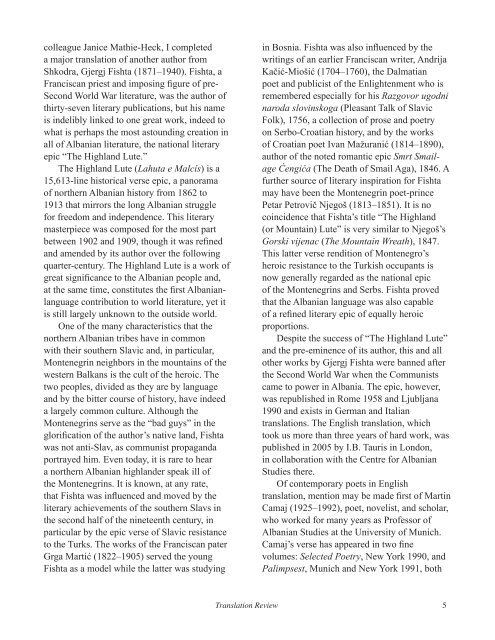Table of contents - The University of Texas at Dallas
Table of contents - The University of Texas at Dallas
Table of contents - The University of Texas at Dallas
You also want an ePaper? Increase the reach of your titles
YUMPU automatically turns print PDFs into web optimized ePapers that Google loves.
colleague Janice M<strong>at</strong>hie-Heck, I completed<br />
a major transl<strong>at</strong>ion <strong>of</strong> another author from<br />
Shkodra, Gjergj Fishta (1871–1940). Fishta, a<br />
Franciscan priest and imposing figure <strong>of</strong> pre-<br />
Second World War liter<strong>at</strong>ure, was the author <strong>of</strong><br />
thirty-seven literary public<strong>at</strong>ions, but his name<br />
is indelibly linked to one gre<strong>at</strong> work, indeed to<br />
wh<strong>at</strong> is perhaps the most astounding cre<strong>at</strong>ion in<br />
all <strong>of</strong> Albanian liter<strong>at</strong>ure, the n<strong>at</strong>ional literary<br />
epic “<strong>The</strong> Highland Lute.”<br />
<strong>The</strong> Highland Lute (Lahuta e Malcís) is a<br />
15,613-line historical verse epic, a panorama<br />
<strong>of</strong> northern Albanian history from 1862 to<br />
1913 th<strong>at</strong> mirrors the long Albanian struggle<br />
for freedom and independence. This literary<br />
masterpiece was composed for the most part<br />
between 1902 and 1909, though it was refined<br />
and amended by its author over the following<br />
quarter-century. <strong>The</strong> Highland Lute is a work <strong>of</strong><br />
gre<strong>at</strong> significance to the Albanian people and,<br />
<strong>at</strong> the same time, constitutes the first Albanianlanguage<br />
contribution to world liter<strong>at</strong>ure, yet it<br />
is still largely unknown to the outside world.<br />
One <strong>of</strong> the many characteristics th<strong>at</strong> the<br />
northern Albanian tribes have in common<br />
with their southern Slavic and, in particular,<br />
Montenegrin neighbors in the mountains <strong>of</strong> the<br />
western Balkans is the cult <strong>of</strong> the heroic. <strong>The</strong><br />
two peoples, divided as they are by language<br />
and by the bitter course <strong>of</strong> history, have indeed<br />
a largely common culture. Although the<br />
Montenegrins serve as the “bad guys” in the<br />
glorific<strong>at</strong>ion <strong>of</strong> the author’s n<strong>at</strong>ive land, Fishta<br />
was not anti-Slav, as communist propaganda<br />
portrayed him. Even today, it is rare to hear<br />
a northern Albanian highlander speak ill <strong>of</strong><br />
the Montenegrins. It is known, <strong>at</strong> any r<strong>at</strong>e,<br />
th<strong>at</strong> Fishta was influenced and moved by the<br />
literary achievements <strong>of</strong> the southern Slavs in<br />
the second half <strong>of</strong> the nineteenth century, in<br />
particular by the epic verse <strong>of</strong> Slavic resistance<br />
to the Turks. <strong>The</strong> works <strong>of</strong> the Franciscan p<strong>at</strong>er<br />
Grga Martić (1822–1905) served the young<br />
Fishta as a model while the l<strong>at</strong>ter was studying<br />
in Bosnia. Fishta was also influenced by the<br />
writings <strong>of</strong> an earlier Franciscan writer, Andrija<br />
Kačić-Miošić (1704–1760), the Dalm<strong>at</strong>ian<br />
poet and publicist <strong>of</strong> the Enlightenment who is<br />
remembered especially for his Razgovor ugodni<br />
naroda slovinskoga (Pleasant Talk <strong>of</strong> Slavic<br />
Folk), 1756, a collection <strong>of</strong> prose and poetry<br />
on Serbo-Cro<strong>at</strong>ian history, and by the works<br />
<strong>of</strong> Cro<strong>at</strong>ian poet Ivan Mažuranić (1814–1890),<br />
author <strong>of</strong> the noted romantic epic Smrt Smailage<br />
Ćengića (<strong>The</strong> De<strong>at</strong>h <strong>of</strong> Smail Aga), 1846. A<br />
further source <strong>of</strong> literary inspir<strong>at</strong>ion for Fishta<br />
may have been the Montenegrin poet-prince<br />
Petar Petrovič Njegoš (1813–1851). It is no<br />
coincidence th<strong>at</strong> Fishta’s title “<strong>The</strong> Highland<br />
(or Mountain) Lute” is very similar to Njegoš’s<br />
Gorski vijenac (<strong>The</strong> Mountain Wre<strong>at</strong>h), 1847.<br />
This l<strong>at</strong>ter verse rendition <strong>of</strong> Montenegro’s<br />
heroic resistance to the Turkish occupants is<br />
now generally regarded as the n<strong>at</strong>ional epic<br />
<strong>of</strong> the Montenegrins and Serbs. Fishta proved<br />
th<strong>at</strong> the Albanian language was also capable<br />
<strong>of</strong> a refined literary epic <strong>of</strong> equally heroic<br />
proportions.<br />
Despite the success <strong>of</strong> “<strong>The</strong> Highland Lute”<br />
and the pre-eminence <strong>of</strong> its author, this and all<br />
other works by Gjergj Fishta were banned after<br />
the Second World War when the Communists<br />
came to power in Albania. <strong>The</strong> epic, however,<br />
was republished in Rome 1958 and Ljubljana<br />
1990 and exists in German and Italian<br />
transl<strong>at</strong>ions. <strong>The</strong> English transl<strong>at</strong>ion, which<br />
took us more than three years <strong>of</strong> hard work, was<br />
published in 2005 by I.B. Tauris in London,<br />
in collabor<strong>at</strong>ion with the Centre for Albanian<br />
Studies there.<br />
Of contemporary poets in English<br />
transl<strong>at</strong>ion, mention may be made first <strong>of</strong> Martin<br />
Camaj (1925–1992), poet, novelist, and scholar,<br />
who worked for many years as Pr<strong>of</strong>essor <strong>of</strong><br />
Albanian Studies <strong>at</strong> the <strong>University</strong> <strong>of</strong> Munich.<br />
Camaj’s verse has appeared in two fine<br />
volumes: Selected Poetry, New York 1990, and<br />
Palimpsest, Munich and New York 1991, both<br />
Transl<strong>at</strong>ion Review 5

















